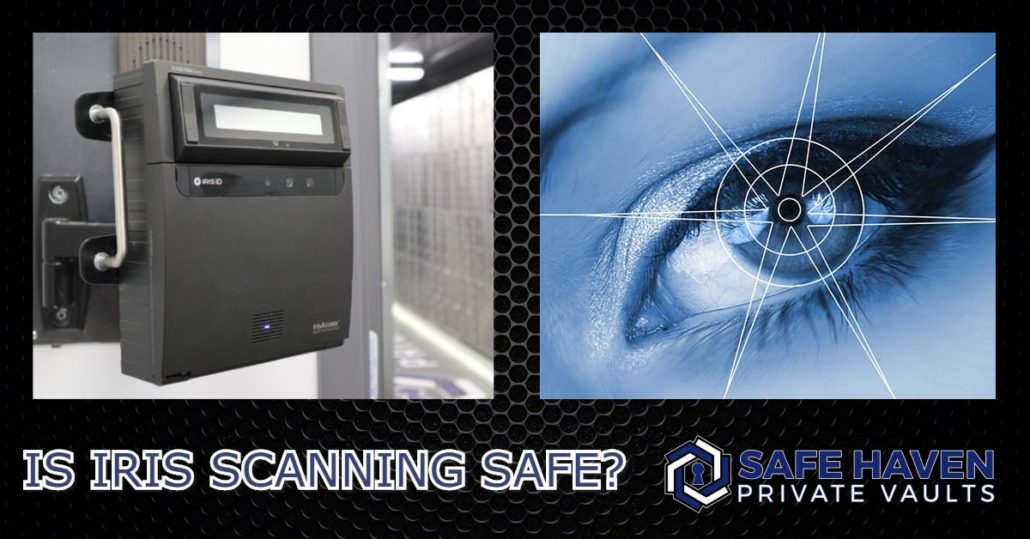Iris scanning is safe for your eyes. Variants of iris scanning exist in both high security areas and even today’s smartphone. Iris scanning is done by using light in the infrared band. Infrared light is just below the visible light on the electromagnetic spectrum. This type of light is all around us all the time. Sunny days feel warm as part of the energy given off by the sun is infrared energy. In nature bodies even give off infrared radiation in the form of body heat. So this type of radiation is something completely natural and something we experience every day.
Does Iris Scanning Harm Us?
The main area that is affected during an iris scan is the eyes and skin around them. Infrared radiation is a non-ionising radiation. This means that infrared energy will not cause cancer. Heat is the only potential side effect, and even that is nearly unmeasurable. Iris scanning takes literally only seconds. So the amount of time a user is exposed to infrared energy is miniculse. That means in the case of iris scanning for security purposes, it is completely safe.
Scanning’s Effect on the Skin
The energy level is so low in the application of iris scanning for security purposes that there is no chance of ever having any damage. With drastically high infrared energy levels for extended durations of exposure, there is a possibility of harm. But in the application of security and iris scanning the job is done in mere seconds.
Scanning’s Effect on the Eyes
For people who work in fields where they are exposed to high levels of infrared energy, such as glass, steel, or other very hot materials, there is a risk to the eyes. Extreme exposure over the course of many years can cause cataracts. This is due to the heat from infrared light causing the proteins in the eye to warm up and become cloudy.
Infrared light is different from visible light. When bright visible light is sensed by the eye, our pupils tighten and we squint naturally to avoid excessive light into our eyes. Infrared light isn’t something we can detect with our eyes so we do not have a natural reaction that protects us from excessive exposure to infrared radiation.
In situations apart from iris scanning for security excessive amounts of infrared radiation can also affect the back of the eye, called the retina. Excessive amounts of radiation to this area of the eye lead to degenerative eye diseases such as macular degeneration, a type of vision loss.
Duration & Intensity of Exposure
Establishing if iris scanning is safe all culminates with the amount and intensity of exposure. If a person is exposed to infrared energy for long periods of time and at high intensities it will cause damage. It is a fact that we are exposed to infrared radiation every time we use a stove, oven, and even our TV remote. Even smartphone manufacturers have installed infrared iris scanning for security purposes on their phones. It is a part of our daily routine and doesn’t cause harm as it is low levels of infrared and typically only for a couple of seconds.
Iris Scanners
Safe Haven uses the highest quality iris scanners from the world leading manufacturer. Essentially iris scanning involves nothing more than the taking of a digital picture of a client’s pattern. Each eye is totally unique, even between twins or an individual’s left and right eye. From the digital picture template patterns are created and a 512-byte encrypted file is created. It cannot be reconstituted or re-engineered to produce any type of visual image. In addition to Safe Haven’s database being offline to protect against hackers, with Iris ID’s encryption it would be impossible to print a contact lens to defeat our security protocols. Best of all for safety our eye scanning technologies are non-contact and do not involve any bright lights or lasers. So it is 100% safe security that you can depend on.
Safe Haven Security Protocols
Learn more about Safe Haven’s security protocols that keep our client’s valuables safe. It is our mission to be the most security private vault/security box facility in the United States. We have made huge investments not only in the blast proof walls and enormous concrete layers but advanced access authentication protocols. All of this culminates in the most secure place to keep precious items, all with the benefit of optional total anonymity.

